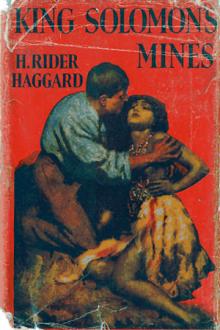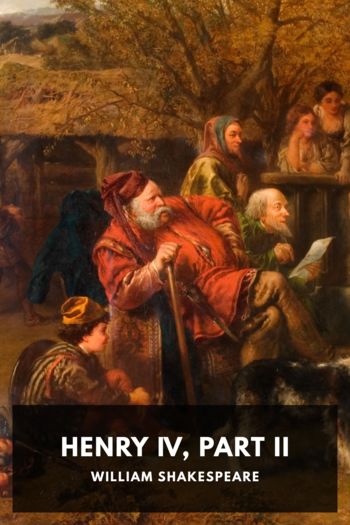King Solomon’s Mines, H. Rider Haggard [best mystery novels of all time TXT] 📗

- Author: H. Rider Haggard
Book online «King Solomon’s Mines, H. Rider Haggard [best mystery novels of all time TXT] 📗». Author H. Rider Haggard
So after we were rested a little, and the Kafirs had cut out the hearts of two of the dead elephants for supper, we started homewards, very well pleased with our day’s work, having made up our minds to send the bearers on the morrow to chop away the tusks.
Shortly after we passed the spot where Good had wounded the patriarchal bull we came across a herd of eland, but did not shoot at them, as we had plenty of meat. They trotted past us, and then stopped behind a little patch of bush about a hundred yards away, wheeling round to look at us. As Good was anxious to get a near view of them, never having seen an eland close, he handed his rifle to Umbopa, and, followed by Khiva, strolled up to the patch of bush. We sat down and waited for him, not sorry of the excuse for a little rest.
The sun was just going down in its reddest glory, and Sir Henry and I were admiring the lovely scene, when suddenly we heard an elephant scream, and saw its huge and rushing form with uplifted trunk and tail silhouetted against the great fiery globe of the sun. Next second we saw something else, and that was Good and Khiva tearing back towards us with the wounded bull—for it was he—charging after them. For a moment we did not dare to fire—though at that distance it would have been of little use if we had done so—for fear of hitting one of them, and the next a dreadful thing happened—Good fell a victim to his passion for civilised dress. Had he consented to discard his trousers and gaiters like the rest of us, and to hunt in a flannel shirt and a pair of veldtschoons, it would have been all right. But as it was, his trousers cumbered him in that desperate race, and presently, when he was about sixty yards from us, his boot, polished by the dry grass, slipped, and down he went on his face right in front of the elephant.
We gave a gasp, for we knew that he must die, and ran as hard as we could towards him. In three seconds it had ended, but not as we thought. Khiva, the Zulu boy, saw his master fall, and brave lad as he was, turned and flung his assegai straight into the elephant’s face. It stuck in his trunk.
With a scream of pain, the brute seized the poor Zulu, hurled him to the earth, and placing one huge foot on to his body about the middle, twined its trunk round his upper part and tore him in two.
We rushed up mad with horror, and fired again and again, till presently the elephant fell upon the fragments of the Zulu.
As for Good, he rose and wrung his hands over the brave man who had given his life to save him, and, though I am an old hand, I felt a lump grow in my throat. Umbopa stood contemplating the huge dead elephant and the mangled remains of poor Khiva.
“Ah, well,” he said presently, “he is dead, but he died like a man!”
V Our March Into the DesertWe had killed nine elephants, and it took us two days to cut out the tusks, and having brought them into camp, to bury them carefully in the sand under a large tree, which made a conspicuous mark for miles round. It was a wonderfully fine lot of ivory. I never saw a better, averaging as it did between forty and fifty pounds a tusk. The tusks of the great bull that killed poor Khiva scaled one hundred and seventy pounds the pair, so nearly as we could judge.
As for Khiva himself, we buried what remained of him in an ant-bear hole, together with an assegai to protect himself with on his journey to a better world. On the third day we marched again, hoping that we might live to return to dig up our buried ivory, and in due course, after a long and wearisome tramp, and many adventures which I have not space to detail, we reached Sitanda’s Kraal, near the Lukanga River, the real starting-point of our expedition. Very well do I recollect our arrival at that place. To the right was a scattered native settlement with a few stone cattle kraals and some cultivated lands down by the water, where these savages grew their scanty supply of grain, and beyond it stretched great tracts of waving “veld” covered with tall grass, over which herds of the smaller game were wandering. To the left lay the vast desert. This spot appears to be the outpost of the fertile country, and it would be difficult to say to what natural causes such an abrupt change in the character of the soil is due. But so it is.
Just below our encampment flowed a little stream, on the farther side of which is a stony slope, the same down which, twenty years before, I had seen poor Silvestre creeping back after his attempt to reach Solomon’s Mines, and beyond that slope begins the waterless desert, covered with a species of karoo shrub.
It was evening when we pitched our camp, and the great ball of the sun was sinking into the desert, sending glorious rays of many-coloured light flying all over its vast expanse. Leaving Good to superintend the arrangement of our little camp, I took Sir Henry with me, and walking to the top of the slope opposite, we gazed across the





Comments (0)